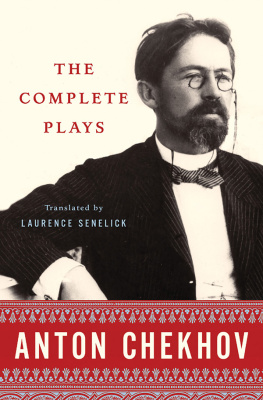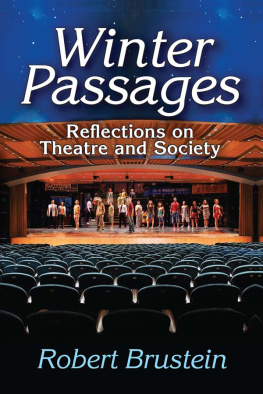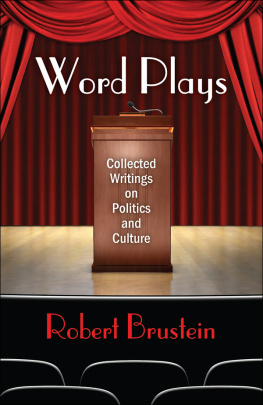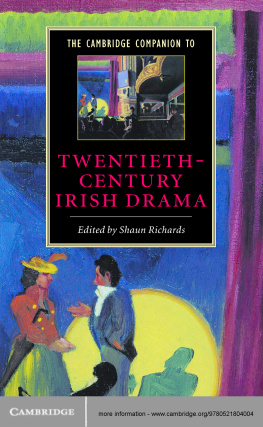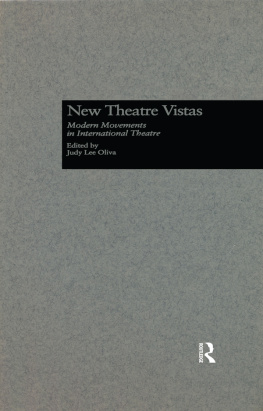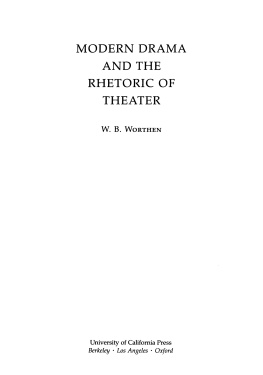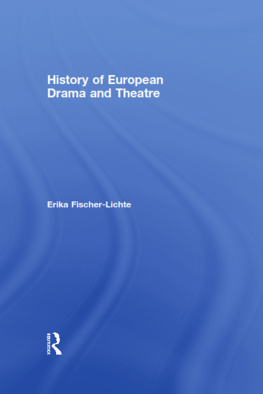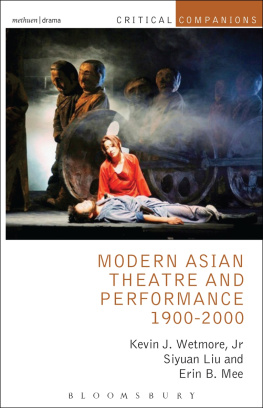THE THEATRE OF REVOLT
THE THEATRE OF REVOLT
An Approach to the Modern Drama
ROBERT BRUSTEIN
WITH A NEW PREFACE BY THE AUTHOR

THE THEATRE OF REVOLT. Copyright 1962, 1963, 1964, 1991 by Robert Brustein. This book was originally published in 1964 and is here reprinted by arrangement with the author.
First ELEPHANT PAPERBACK edition published 1991 by Ivan R. Dee, Inc., 1332 North Halsted Street, Chicago 60622. Manufactured in the United States of America and printed on acid-free paper.
Library of Congress Cataloging-in-Publication Data:
Brustein, Robert Sanford, 1927
The theatre of revolt : an approach to the modern drama / Robert Brustein. 1st Elephant paperback ed.
p. cm.
Reprint. Originally published: Boston : Little, Brown, 1964.
Includes bibliographical references and index.
ISBN 0-929587-53-7 ISBN: 978-0-929587-53-0
1. Drama20th centuryHistory and criticism. I. Title.
PN2189.B7 1991
809.2'04dc20 90-23644
FOR NORMA: La bella donna della mia mente
Foreword
The purposes of this book are threefold: to examine the development of a single consuming idea or attitude in eight modern playwrights; to analyze the work of these writers in depth; and to suggest an approach to the modern drama as a whole. The undertaking is ambitious, and, no doubt, smacks of presumption. How can eight men adequately represent such a large and complicated manifestation as modern dramatic literature? How indeed can one attitude or idea suitably encompass the variety in the work of these eight alone? To justify my claim, I hope to demonstrate, during the course of this study, that the theme of revolt is sufficiently general and inclusive to merit this unusual emphasis: it is the current which runs through the majority of modern plays. Similarly, I hope to show how a playwrights handling of this theme determines his approach to character, plot, diction, and style. If I can persuade the reader of this through reference to the writers I have included, he will then be able to see, I hope, how this method can be fruitfully applied to many playwrights not directly considered in these pages. The modern drama has hitherto been studied largely from the point of view of style as a manifestation of Realism, Naturalism, Symbolism, Expressionism, etc. By treating the modern drama as an expression of revolt, I intend to illustrate how all these isms merely disguise the essential unity of this movement. For a movement it is, the most important modern dramatists being bound together by common assumptions and a common point of attack.
These assertions I must justify in the book. But here I must defend my choice of those eight writers included for special study: Ibsen, Strindberg, Shaw, Chekhov, Brecht, Pirandello, ONeill, and (considered together with Artaud) Genet. Most of these names need no justification; but the list is partial; and there may be disappointment over the exclusion of this or that particular playwright. In anticipation of these objections, I should declare that my selection was guided partly by principle, partly by prejudice. I believe these eight dramatists to be the finest, most enduring writers in the field; and I was determined not to include any playwright who would not be read fifty years hence. There are those who may regret the omission of Sean OCasey; but he has always struck me as an extremely overrated writer with two or three competent Naturalist plays to his credit, followed by a lot of ideological bloat and embarrassing bombast. Jean Giraudoux and Jean Anouilh are widely regarded, but it is no doubt a fault in me that I have never been able to respond very strongly to either: both strike me as gifted stylists with shallow points of view and fragile sensibilities. Albert Camus and Jean Paul Sartre are stimulating minds but indifferent dramatists; I have, therefore, exploited their ideas while ignoring their plays. Among American playwrights, Thornton Wilder, Arthur Miller, and Tennessee Williams all have enthusiastic partisans: I am not among them. There are a number of newer writers especially Beckett, Ionesco, and Drrenmatt who strike me as very interesting, but none has yet completed a sufficiently various body of writing to be included in this book (though many are discussed in passing). I do regret that I was not able to consider the plays of Synge, Lorca, and Yeats. I admire all three writers excessively; but while I could probably justify their omission on the grounds that their work is not sufficiently ambitious or varied, the simple fact is that I omitted them for lack of space. If the interested reader sees the relevance of their work to the drama of revolt, then I have accomplished a major purpose of this book.
I wish to thank those who gave generously of their time and advice, especially during the early stages in the preparation of this manuscript: Eric Bentley, who prodded me into new areas of thought, George P. Elliott, who provoked me into new areas of feeling, Evert Sprinchorn, who opened up new areas of research, Stanley Burnshaw, who corrected my grammar. Whatever errors the book still contains, of course, are my own; but many errors were avoided with the help of these good men. I also wish to thank my students at Columbia College, who continue to be a source of intellectual stimulation to me, and who unwittingly helped to write this book. And I am indebted to the Guggenheim Foundation for a grant in 1961-1962, and to Columbias Council for Research in the Humanities for two grants in lieu of summer teaching. Finally, I wish to thank my stepson, Phillip, for permitting me to devote time to writing that otherwise would have been spent with him; and my dear wife, Norma, for her continuing support, encouragement, and love to one who was often morose, and discouraged at his labors.
Preface to the Second Edition
Over a quarter of a century has passed since The Theatre of Revolt was first published, years which constitute a period of considerable activity in the drama. Readers and students sometimes ask me if the intervening time has altered my estimation of the playwrights discussed or my perception of the movement they represented. I am asked even more often whom I would have included if the book were to be written today.
My answer to the first question is a qualified no. Revolt in its messianic, social, and existential manifestations still seems to me a highly useful way, though not the only way, to characterize the Romantic movement of modern drama. And virtually all the eight playwrights included have maintained their high status as the strongest influences on the direction of this movement in its form and substance. Samuel Beckettamong those I found it premature to include, having not yet completed a sufficiently various body of writingis a significant omission. He is the great metaphysical playwright of our time and perhaps the most characteristic exponent of what I called existential revolt. I regret my failure to give him a chapter of his own.
I think, too, that if The Theatre of Revolt were to be written today, it would have to include a chapter on post-ONeill American playwrights, notably David Mamet, Sam Shepard, and David Rabe, as well as on the visionary auteur/director Robert Wilson, who is beginning to restore to the drama some of its earlier messianic ambitions. Harold Pinter, David Hare, and Caryl Churchill merit attention as a manifestation of post-Shaw British revolt, though like the Americans none yet deserves a single chapter to him- or herself. The same is true of post-Brecht German drama (Handke, Kroetz, Mueller), post-Pirandello Italian (Dario Fo), and post-Chekhov Russian (Mayakovsky and Bulgakov). No single dramatist separates himself from the national pack in the manner of the eight seminal figures who form the substance of the book.
Next page

